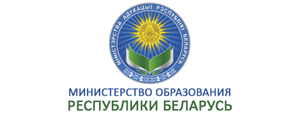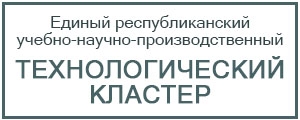Учебная дисциплина «Химия»
1-36 09 01 Машины и аппараты пищевых производств
1-36 20 01 Низкотемпературная техника
Цель изучения дисциплины: химическая подготовка студентов в соответствии с образовательным стандартом и формирование на базе освоения основных химических законов и теорий профессиональных компетенций в области химии для работы на пищевых предприятиях; формирование у студентов целостной системы представлений о роли химии в естественных науках и развитии производства.
Краткое содержание дисциплины: основные понятия и законы химии; основные классы неорганических соединений; растворы; ионообменные реакции в растворах электролитов и гидролиз солей; окислительно-восстановительные реакции и электрохимические процессы; химическая термодинамика и кинетика; строение атома и химическая связь; химические свойства s-, p-, d-элементов и их соединений; органические соединения; полимеры.
Учебная дисциплина «Теоретические основы химии»
1-48 01 02 Химическая технология органических веществ, материалов и изделий. Специализация 1-48 01 02 02 – Технология волокнистых и плёночных материалов и изделий.
Цель изучения дисциплины: приобретение студентами знаний, навыков и умений, необходимых для изучения последующих химических дисциплин: «Неорганическая химия», «Органическая химия», «Аналитическая химия и физико-химические методы анализа», «Физическая и коллоидная химия» и применение приобретённых знаний и навыков при изучении специальных дисциплин по технологии отрасли.
Краткое содержание дисциплины: атомно-молекулярное учение и стехиометрические законы химии; строение вещества: строение атома и химическая связь; модели химической связи: метод ВС и МО ЛКАО; общие закономерности протекания химических реакций; общие свойства растворов; растворы электролитов; физико-химические процессы при растворении электролитов; ионно-молекулярные (обменные) реакции в растворах электролитов (гидролиз; гетерогенные равновесия с участием малорастворимых солей; процессы комплексообразования); окислительно-восстановительные реакции и электрохимические процессы.
Учебная дисциплина «Неорганическая химия»
1-48 01 02 Химическая технология органических веществ, материалов и изделий. Специализация 1-48 01 02 02 – Технология волокнистых и плёночных материалов и изделий.
Цель изучения дисциплины: закрепление знаний, умений и навыков, приобретённых студентами при изучении дисциплины «Теоретические основы химии», применение их к прогнозированию характерных химических свойств неорганических соединений при составлении уравнений реакций с их участием.
Краткое содержание дисциплины: классификация и номенклатура неорганических соединений; химические свойства классов неорганических соединений; металлы и неметаллы в периодической системе химических элементов, прогнозирование свойств элементов, простых веществ и химических соединений по положению элемента в периодической системе; неметаллы и их соединения; металлы и их соединения; применение соединений металлов и неметаллов в производстве минеральных удобрений, гальванотехнике, аналитической практике; качественные реакции на ионы металлов и неметаллов; токсичность соединений ряда металлов и неметаллов, экологические аспекты их практического применения.
Учебная дисциплина «Общая и неорганическая химия»
1-91 01 01 Производство продукции и организация общественного питания
1-49 01 01 Технология хранения и переработки пищевого растительного сырья
1-49 01 02 Технология хранения и переработки животного сырья
Цель изучения дисциплины: приобретение студентами-технологами знаний, необходимых для изучения других химических дисциплин, таких как «Аналитическая химия и физико-химические методы анализа», «Физическая и коллоидная химия», «Биологическая химия» и использование приобретенных знаний и навыков для последующего изучения специальных дисциплин по технологии отрасли.
Краткое содержание дисциплины: основные фундаментальные законы и понятия химии, классификация и номенклатура неорганических соединений, связь строения вещества и его реакционной способности, основные типы химических реакций и закономерности их протекания, химические основы процессов, лежащие в основе технологий производства пищевых продуктов, количественные расчеты в химии.
Учебная дисциплина «Общая и неорганическая химия»
1-33 01 07 Природоохранная деятельность (по направлениям);
направление специальности 1-33 01 07 02 Природоохранная деятельность (экологический мониторинг)
Цель изучения дисциплины: освоение законов и теорий общей и неорганической химии, как фундамента для изучения других естественно-научных, специальных и профессиональных дисциплин; развитие у будущего специалиста химического мышления, формирование навыков и умений химического эксперимента, формирование у студентов целостной системы представлений о роли химии в естественных науках, в научно-техническом прогрессе и развитии современного индустриального общества.
Краткое содержание дисциплины: основные классы неорганических соединений; реакции ионного обмена; стехиометрические законы химии; общие свойства растворов; химическое равновесие; растворы электролитов; строение атома, Периодический закон и периодическая система химических элементов; химическая связь; комплексные соединения; окислительно-восстановительные реакции.
Учебная дисциплина «Общая, неорганическая и физическая химия»
1-53 01 01 Автоматизация технологических процессов и производств
Цель изучения дисциплины: получение будущими специалистами в области автоматизации технологических процессов и производств знаний о строении и химических свойствах неорганических веществ, закономерностях протекания реакций и формирование на этой основе естественнонаучного мировоззрения, химического мышления, системы теоретических и практических знаний для дальнейшего освоения общетехнических специальных дисциплин.
Краткое содержание дисциплины: основные законы и понятия химии; классификация и номенклатура неорганических соединений; химические свойства основных классов неорганических соединений и важнейших неорганических веществ; особенности поведения электролитов и неэлектролитов в растворах; основы электрохимических процессов и способы определения их количественных характеристик; химическое равновесие и химическая термодинамика; фазовое равновесие; основы кинетики химических процессов.
Учебная дисциплина «Аналитическая химия
и физико-химические методы анализа»
1-91 01 01 Производство продукции и организация общественного питания
1-49 01 01 Технология хранения и переработки пищевого растительного сырья
1-49 01 02 Технология переработки животного сырья
Цель изучения дисциплины: углубленное рассмотрение и практическое закрепление закономерностей проведения количественного и качественного анализов с применением фундаментальных законов химии и физики и необходимого математического аппарата, освоение основ химических и физико-химических методов анализа.
Краткое содержание дисциплины: изучение теоретических основ химических и физико-химических методов анализа, титриметрия, кондуктометрия, потенциометрия, фотоколориметрия, спектрофотометрия, рефрактометрия, применение аналитических методик для количественного определения веществ.
Учебная дисциплина «Аналитическая химия
и физико-химические методы анализа»
1-48 01 02 Химическая технология органических веществ, материалов и изделий. Специализация 1-48 01 02 02 – Технология волокнистых и плёночных материалов и изделий.
Цель изучения дисциплины: формирование у будущего специалиста системы теоретических знаний в области аналитической химии и физико-химических методов анализа, которая позволит в будущей профессиональной деятельности выбрать и обосновать оптимальный способ решения конкретной аналитической задачи.
Краткое содержание дисциплины: теоретические основы и аналитические возможности химических и физико-химических методов анализа, принципы выбора метода анализа применительно к конкретному анализируемому объекту, статистическая обработка аналитической информации.
Учебная дисциплина «Аналитическая химия»
1-33 01 07 Природоохранная деятельность (по направлениям);
направление специальности 1-33 01 07 02 Природоохранная деятельность (экологический мониторинг)
Цель изучения дисциплины: изучение теоретических основ химических методов анализа, формирование умений и навыков основных аналитических операций, формирование умений самостоятельной работы в выборе методов анализа и овладение техникой выполнения аналитических операций различных химических методов анализа.
Краткое содержание дисциплины: метрологические характеристики методов анализа, основные приемы работы в химической лаборатории с реактивами и посудой, весовым оборудованием; способы выражения концентрации растворов, техника приготовления растворов, техника титриметрического анализа, расчеты в титриметрическом анализе, общие сведения о гравиметрическом методе анализа, о физических и физико-химических методах анализа.
Учебная дисциплина «Физическая и коллоидная химия»
1-48 01 02 Химическая технология органических веществ, материалов и изделий. Специализация 1-48 01 02 02 – Технология волокнистых и плёночных материалов и изделий.
Цель изучения учебной дисциплины: углубленное рассмотрение химических явлений и процессов с применением законов физики и необходимого математического аппарата, выявление основных закономерностей протекания химических реакций, конкретизация фундаментальных знаний в области основных законов естествознания.
Краткое содержание дисциплины: Сложные химические равновесия в растворах электролитов. Основы электрохимии. Свойства водных растворов электролитов. Основы термодинамики химического равновесия. Диаграммы состояния. Основы химической кинетики. Поверхностные явления. Капиллярные явления. Адсорбция на границе раздела фаз. Дисперсные системы. Образование и устойчивость лиофильных дисперсных систем. Образование и устойчивость лиофобных дисперсных систем. Свойства дисперсных систем.
Учебная дисциплина «Физическая и коллоидная химия»
1-49 01 01 Технология хранения и переработки пищевого растительного сырья
1-49 01 02 Технология хранения и переработки животного сырья
1-91 01 01 Производство продукции и организация общественного питания
Цель изучения дисциплины: углубленное рассмотрение химических явлений и процессов с применением законов физики и необходимого математического аппарата, формирование у студентов теоретических основ для рассмотрения пищевых технологий с точки зрения физико-химических и коллоидно-химических процессов, использование полученных теоретических и практических знаний и умений при изучении дисциплин, излагающих основы технологии пищевых производств.
Краткое содержание дисциплины: основные понятия и законы физической и коллоидной химии, влияние различных факторов на степень химического превращения и выход продуктов химических реакций, химическое равновесие в растворах, физико-химические основы электрохимических процессов, фазовое равновесие, диаграммы состояния, поверхностные явления и адсорбция, физические и химические свойства дисперсных и коллоидных систем.
Academic discipline "Chemistry"
1-36 09 01 Machines and apparatuses of food production
1-36 20 01 Low temperature equipment
The purpose of studying the discipline: chemical training of students in accordance with the educational standard and the formation on the basis of the development of basic chemical laws and theories of professional competencies in the field of chemistry for work at food enterprises; the formation of students' holistic system of ideas about the role of chemistry in the natural sciences and the development of production.
Summary of the discipline: basic concepts and laws of chemistry; basic classes of inorganic compounds; solutions; ion exchange reactions in electrolyte solutions and salt hydrolysis; redox reactions and electrochemical processes; chemical thermodynamics and kinetics; atomic structure and chemical bonding; chemical properties of s-, p-, d-elements and their compounds; organic compounds; polymers.
Academic discipline "Theoretical foundations of chemistry"
1-48 01 02 Chemical technology of organic substances, materials and products. Specialization 1-48 01 02 02 – Technology of fibrous and film materials and products.
The purpose of studying the discipline: the acquisition by students of knowledge, skills and abilities necessary for the study of subsequent chemical disciplines: "Inorganic chemistry", "Organic chemistry", "Analytical chemistry and physico-chemical methods of analysis", "Physical and colloidal chemistry" and the application of acquired knowledge and skills in the study of special disciplines in the technology industry.
Summary of the discipline: atomic-molecular doctrine and stoichiometric laws of chemistry; structure of matter: atomic structure and chemical bonding; chemical bonding models: the BC and MO LCAO method; general patterns of chemical reactions; general properties of solutions; electrolyte solutions; physico-chemical processes during electrolyte dissolution; ion-molecular (exchange) reactions in electrolyte solutions (hydrolysis; heterogeneous equilibria involving poorly soluble salts; complexation processes); redox reactions and electrochemical processes.
Academic discipline "Inorganic chemistry"
1-48 01 02 Chemical technology of organic substances, materials and products. Specialization 1-48 01 02 02 – Technology of fibrous and film materials and products.
The purpose of studying the discipline: to consolidate the knowledge, skills and abilities acquired by students in the study of the discipline "Theoretical foundations of chemistry", their application to the prediction of the characteristic chemical properties of inorganic compounds in the formulation of reaction equations with their participation.
Summary of the discipline: classification and nomenclature of inorganic compounds; chemical properties of classes of inorganic compounds; metals and nonmetals in the periodic table of chemical elements, prediction of properties of elements, simple substances and chemical compounds by the position of the element in the periodic table; nonmetals and their compounds; metals and their compounds; application of compounds of metals and nonmetals in the production of mineral fertilizers, electroplating, analytical practice; qualitative reactions to metal ions and nonmetals; toxicity of compounds of a number of metals and nonmetals, environmental aspects of their practical application.
Academic discipline "General and inorganic chemistry"
1-91 01 01 Production and catering organization
1-49 01 01 Technology of storage and processing of edible plant raw materials
1-49 01 02 Technology of storage and processing of animal raw materials
The purpose of studying the discipline: the acquisition by technology students of the knowledge necessary for the study of other chemical disciplines, such as "Analytical chemistry and physico-chemical methods of analysis", "Physical and colloidal chemistry", "Biological Chemistry" and the use of acquired knowledge and skills for the subsequent study of special disciplines in the technology industry.
Summary of the discipline: the basic fundamental laws and concepts of chemistry, classification and nomenclature of inorganic compounds, the relationship of the structure of a substance and its reactivity, the main types of chemical reactions and patterns of their course, the chemical foundations of the processes underlying food production technologies, quantitative calculations in chemistry
Academic discipline "General and inorganic chemistry"
1-33 01 07 Environmental activities (by directions);
specialty direction 1-33 01 07 02 Environmental protection (environmental monitoring)
The purpose of studying the discipline: mastering the laws and theories of general and inorganic chemistry as a foundation for the study of other natural science, special and professional disciplines; development of chemical thinking in a future specialist, formation of skills and abilities of chemical experiment, formation of students' holistic system of ideas about the role of chemistry in the natural sciences, in scientific and technological progress and development of modern industrial society.
Summary of the discipline: main classes of inorganic compounds; ion exchange reactions; stoichiometric laws of chemistry; general properties of solutions; chemical equilibrium; electrolyte solutions; atomic structure, Periodic law and periodic system of chemical elements; chemical bonding; complex compounds; redox reactions.
Academic discipline "General, inorganic and physical chemistry"
1-53 01 01 Automation of technological processes and productions
The purpose of studying the discipline: future specialists in the field of automation of technological processes and production of knowledge about the structure and chemical properties of inorganic substances, the laws of reactions and the formation on this basis of a natural science worldview, chemical thinking, a system of theoretical and practical knowledge for further development of general technical special disciplines.
Summary of the discipline: basic laws and concepts of chemistry; classification and nomenclature of inorganic compounds; chemical properties of the main classes of inorganic compounds and the most important inorganic substances; features of the behavior of electrolytes and nonelectrolytes in solutions; fundamentals of electrochemical processes and methods for determining their quantitative characteristics; chemical equilibrium and chemical thermodynamics; phase equilibrium; fundamentals of the kinetics of chemical processes.
Academic discipline "Analytical chemistry
and physico-chemical methods of analysis"
1-91 01 01 Production and catering organization
1-49 01 01 Technology of storage and processing of edible plant raw materials
1-49 01 02 Technology of processing of animal raw materials
The purpose of studying the discipline: in-depth consideration and practical consolidation of the regularities of quantitative and qualitative analyses using the fundamental laws of chemistry and physics and the necessary mathematical apparatus, mastering the basics of chemical and physico-chemical methods of analysis.
Summary of the discipline: study of the theoretical foundations of chemical and physico-chemical methods of analysis, titrimetry, conductometry, potentiometry, photocolorimetry, spectrophotometry, refractometry, application of analytical techniques for the quantitative determination of substances.
Academic discipline "Analytical chemistry
and physico-chemical methods of analysis"
1-48 01 02 Chemical technology of organic substances, materials and products. Specialization 1-48 01 02 02 – Technology of fibrous and film materials and products.
The purpose of studying the discipline: the formation of a future specialist's system of theoretical knowledge in the field of analytical chemistry and physico-chemical methods of analysis, which will allow in future professional activity to choose and justify the optimal way to solve a specific analytical problem.
Summary of the discipline: theoretical foundations and analytical capabilities of chemical and physico-chemical methods of analysis, principles of choosing the method of analysis in relation to a specific analyzed object, statistical processing of analytical information.
Academic discipline "Analytical chemistry"
1-33 01 07 Environmental activities (by directions);
specialty 1-33 01 07 02 Environmental protection (environmental monitoring)
The purpose of the discipline: the study of the theoretical foundations of chemical methods of analysis, the formation of skills and skills of basic analytical operations, the formation of skills of independent work in the selection of methods of analysis and mastering the technique of performing analytical operations of various chemical methods of analysis.
Summary of the discipline: metrological characteristics of analysis methods, basic techniques of working in a chemical laboratory with reagents and utensils, weighing equipment; methods of expressing the concentration of solutions, the technique of preparing solutions, the technique of titrimetric analysis, calculations in titrimetric analysis, general information about the gravimetric method of analysis, physical and physico-chemical methods of analysis.
Academic discipline "Physical and colloidal chemistry"
1-48 01 02 Chemical technology of organic substances, materials and products. Specialization 1-48 01 02 02 – Technology of fibrous and film materials and products.
The purpose of studying the discipline: in-depth consideration of chemical phenomena and processes using the laws of physics and the necessary mathematical apparatus, identification of the main patterns of chemical reactions, concretization of fundamental knowledge in the field of basic laws of natural science.
Summary of the discipline: Complex chemical equilibria in electrolyte solutions. Fundamentals of electrochemistry. Properties of aqueous solutions of electrolytes. Fundamentals of thermodynamics of chemical equilibrium. Status diagrams. Fundamentals of chemical kinetics. Surface phenomena. Capillary phenomena. Adsorption at the interface of phases. Dispersed systems. Formation and stability of lyophilic dispersed systems. Formation and stability of lyophobic dispersed systems. Properties of dispersed systems.
Academic discipline "Physical and colloidal chemistry"
1-48 01 02 Chemical technology of organic substances, materials and products. Specialization 1-48 01 02 02 – Technology of fibrous and film materials and products.
The purpose of studying the discipline: in-depth consideration of chemical phenomena and processes using the laws of physics and the necessary mathematical apparatus, identification of the main patterns of chemical reactions, concretization of fundamental knowledge in the field of basic laws of natural science.
Summary of the discipline: Complex chemical equilibria in electrolyte solutions. Fundamentals of electrochemistry. Properties of aqueous solutions of electrolytes. Fundamentals of thermodynamics of chemical equilibrium. Status diagrams. Fundamentals of chemical kinetics. Surface phenomena. Capillary phenomena. Adsorption at the interface of phases. Dispersed systems. Formation and stability of lyophilic dispersed systems. Formation and stability of lyophobic dispersed systems. Properties of dispersed systems.
Academic discipline "Physical and colloidal chemistry"
1-49 01 01 Technology of storage and processing of edible plant raw materials
1-49 01 02 Technology of storage and processing of animal raw materials
1-91 01 01 Production and catering organization
The purpose of studying the discipline: in-depth consideration of chemical phenomena and processes using the laws of physics and the necessary mathematical apparatus, the formation of students' theoretical foundations for considering food technologies from the point of view of physico-chemical and colloidal chemical processes, the use of theoretical and practical knowledge and skills obtained in the study of disciplines outlining the basics of food production technology.
Summary of the discipline: basic concepts and laws of physical and colloidal chemistry, the influence of various factors on the degree of chemical transformation and the yield of chemical reaction products, chemical equilibrium in solutions, physico-chemical foundations of electrochemical processes, phase equilibrium, state diagrams, surface phenomena and adsorption, physical and chemical properties of dispersed and colloidal systems.

















